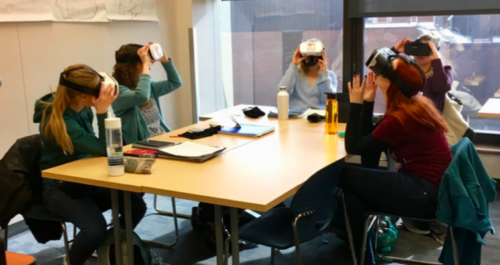
Instructors from the Department of World Languages presented at The Idaho Association of Teachers of Language and Culture conference held Oct. 4-5 in Nampa.
Kelly Arispe presented a backwards design approach to creating summative assessments and a thematic unit using Idaho world language content standards. In addition, she discussed rubric design that aligns to the performance level of the learners and enables teachers to assess project-based, communicative assessments efficiently and objectively.
Manuel Gómez-Navarro presented his experience implementing virtual tours in an upper division Spanish culture class. He showcased different virtual reality headsets, as well as online platforms to create virtual tours for education. Gómez-Navarro also lead a session using headsets; the participants had the opportunity to try some of the virtual tours he created for his class.
Ángeles Gómez presented an overview of how to use signature activities in the Spanish classroom, where students are asked to walk around the classroom and ask questions of different classmates, get answers and ask for a signature. This communicative activity promotes interaction among students.
Amber Hoye and Kelly Arispe showcased their upcoming project, the PATHWAYS Language Teaching Repository, a free open-education resource for language instructors. The site soon will host over 450 classroom-ready activities aligned to standards for the state of Idaho and the American Council on the Teaching of Foreign Languages. In addition, Arispe gave an overview of her Osher grant project that uses digital tags to augment video classroom implementation feedback. She and Hoye will pair PATHWAYS activities with exemplar, digitally-tagged videos. Foreign language teachers will be able to access classroom-ready materials and watch a demonstration to see how they would implement them.
Beret Norman presented an overview of the various political parties that have won seats in German, Austrian and Swiss parliaments, and included worksheets for students to familiarize themselves with the parties. Topics such as the percentage of women in each parliament and the recent rise of right-wing populist and nationalist parties also were discussed, with the goal of providing topics for group and individual projects at the German 3 and 4 levels.